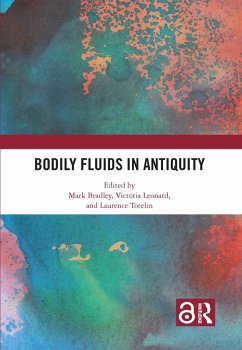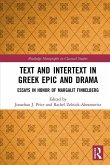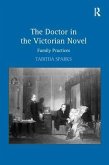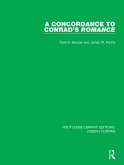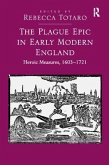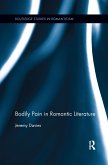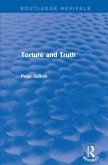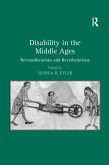Bodily Fluids in Antiquity
Herausgeber: Bradley, Mark; Totelin, Laurence; Leonard, Victoria
Bodily Fluids in Antiquity
Herausgeber: Bradley, Mark; Totelin, Laurence; Leonard, Victoria
- Broschiertes Buch
- Merkliste
- Auf die Merkliste
- Bewerten Bewerten
- Teilen
- Produkt teilen
- Produkterinnerung
- Produkterinnerung
From ancient Egypt to Imperial Rome, from Greek medicine to early Christianity, this volume examines how human bodily fluids influenced ideas about gender, sexuality, politics, emotions, and morality, and how those ideas shaped later European thought.
Andere Kunden interessierten sich auch für
![Text and Intertext in Greek Epic and Drama Text and Intertext in Greek Epic and Drama]() Text and Intertext in Greek Epic and Drama64,99 €
Text and Intertext in Greek Epic and Drama64,99 €![The Doctor in the Victorian Novel The Doctor in the Victorian Novel]() Tabitha SparksThe Doctor in the Victorian Novel76,99 €
Tabitha SparksThe Doctor in the Victorian Novel76,99 €![A Concordance to Conrad's Romance A Concordance to Conrad's Romance]() Todd K. BenderA Concordance to Conrad's Romance55,99 €
Todd K. BenderA Concordance to Conrad's Romance55,99 €![The Plague Epic in Early Modern England The Plague Epic in Early Modern England]() The Plague Epic in Early Modern England68,99 €
The Plague Epic in Early Modern England68,99 €![Bodily Pain in Romantic Literature Bodily Pain in Romantic Literature]() Jeremy DaviesBodily Pain in Romantic Literature68,99 €
Jeremy DaviesBodily Pain in Romantic Literature68,99 €![Torture and Truth (Routledge Revivals) Torture and Truth (Routledge Revivals)]() Page DuboisTorture and Truth (Routledge Revivals)52,99 €
Page DuboisTorture and Truth (Routledge Revivals)52,99 €![Disability in the Middle Ages Disability in the Middle Ages]() Disability in the Middle Ages63,99 €
Disability in the Middle Ages63,99 €-
-
-
From ancient Egypt to Imperial Rome, from Greek medicine to early Christianity, this volume examines how human bodily fluids influenced ideas about gender, sexuality, politics, emotions, and morality, and how those ideas shaped later European thought.
Hinweis: Dieser Artikel kann nur an eine deutsche Lieferadresse ausgeliefert werden.
Hinweis: Dieser Artikel kann nur an eine deutsche Lieferadresse ausgeliefert werden.
Produktdetails
- Produktdetails
- Verlag: Taylor & Francis Ltd (Sales)
- Seitenzahl: 432
- Erscheinungstermin: 31. Mai 2023
- Englisch
- Abmessung: 246mm x 174mm x 23mm
- Gewicht: 739g
- ISBN-13: 9780367764067
- ISBN-10: 0367764067
- Artikelnr.: 67822493
- Verlag: Taylor & Francis Ltd (Sales)
- Seitenzahl: 432
- Erscheinungstermin: 31. Mai 2023
- Englisch
- Abmessung: 246mm x 174mm x 23mm
- Gewicht: 739g
- ISBN-13: 9780367764067
- ISBN-10: 0367764067
- Artikelnr.: 67822493
Mark Bradley is Professor of Classics and Associate Pro-Vice-Chancellor at the University of Nottingham, UK. Together with Shane Butler (Johns Hopkins University, USA), he is editor of a series of volumes on 'The Senses in Antiquity' for Routledge, for which he has contributed a volume on Smell and the Ancient Senses (2015). Victoria Leonard is a Research Fellow at the Centre for Arts, Memory and Communities at Coventry University, and at the Institute of Classical Studies, University of London. Her research focuses on the late antique and early medieval western Mediterranean. She has published on religious conflict, gender and violence, and ancient historiography. Laurence Totelin is Reader in Ancient History at Cardiff University, UK. She has published widely on Greek and Roman botany, pharmacology, and gynaecology.
List of figures; List of tables; Acknowledgments; Contributors;
Introduction, Mark Bradley, Victoria Leonard, and Laurence Totelin; Part I
The language of fluidity; 1. Fluid vocabulary: flux in the lexicon of
bodily emissions, Amy Coker; Part II A woman in flux; 2. A valid excuse for
a day off work: menstruation in an ancient Egyptian village, Rosalind
Janssen; 3. Uterine bleeding, knowledge, and emotion in ancient Greek
medical and magical representations, Irene Salvo; 4. Puellae gently glow:
scent, sweat, and the real in Latin love elegy and Ovid's didactic works,
Jane Burkowski; 5. Overflowing bodies and a Pandora of Ivory: the pure
humours of an erotic surrogate, Catalina Popescu; Part III Erotic and
generative fluids; 6. The eyes have it: from generative fluids to vision
rays, Julie Laskaris; 7. 'Infertile' and 'sub-fertile' semen in the
Hippocratic Corpus and the biological works of Aristotle, Rebecca Fallas;
8. Say it with fluids: what the body exudes and retains when Juvenal's
couple relationships go awry, Claude-Emmanuelle Centlivres Challet; 9.
Flabby flesh and foetal formation: body fluidity and foetal sex
differentiation in Ancient Greek medicine, Tara Mulder; 10. One-seed,
two-seed, three-seed? Reassessing ancient theories of generation, Rebecca
Flemming; 11. Phalli fighting with fluids: approaching images of
ejaculating phalli in the Roman world, Adam Parker; Part IV Nutritive and
healthy fluids; 12. A natural symbol? The (un)importance of blood in early
Greek literary and religious contexts, Emily Kearns; 13. Taste and the
senses: Galen's humours clarified, John Wilkins; 14. Breastmilk,
breastfeeding, and the female body in early Imperial Rome, Thea Lawrence;
15. Breastmilk in the cave and on the arena: early Christian stories of
lactation in context, Laurence Totelin; Part V Dissolving and liquefying
bodies; 16. Tears and the leaky vessel: permeable and fluid bodies in Ovid
and Lucretius, Peter Kelly; 17. Seneca's corpus: a sympathy of fluids and
fluctuations, Michael Goyette; 18. Bodily fluids, grotesque imagery, and
poetics in Persius' Satires, Andreas Gavrielatos; Part VI Wounded and
putrefying bodies; 19. 'Efflux is my manifestation': positive conceptions
of putrefactive fluids in the ancient Egyptian coffin texts, Tasha
Dobbin-Bennett; 20. The physiology of matricide: revenge and metabolism
imagery in Aeschylus' Oresteia, Goran Vidovi¿; 21. Open wounds, liquid
bodies, and melting selves in Early Imperial Latin literature, Assaf Krebs;
Part VII Ancient fluids: afterlife and reception; 22. The reception of
Classical constructions of blood in Medieval and Early Modern
martyrologies, Anastasia Stylianou; 23. 'Expelling the purple tyrant from
the citadel': the menstruation debate in book 2 of Abraham Cowley's
Plantarum libri sex (1662), Caroline Spearing; 24. Opening the body of
fluids: taking in and pouring out in Renaissance readings of Classical
women, Helen King; Envoi, Mark Bradley and Victoria Leonard; Index
Introduction, Mark Bradley, Victoria Leonard, and Laurence Totelin; Part I
The language of fluidity; 1. Fluid vocabulary: flux in the lexicon of
bodily emissions, Amy Coker; Part II A woman in flux; 2. A valid excuse for
a day off work: menstruation in an ancient Egyptian village, Rosalind
Janssen; 3. Uterine bleeding, knowledge, and emotion in ancient Greek
medical and magical representations, Irene Salvo; 4. Puellae gently glow:
scent, sweat, and the real in Latin love elegy and Ovid's didactic works,
Jane Burkowski; 5. Overflowing bodies and a Pandora of Ivory: the pure
humours of an erotic surrogate, Catalina Popescu; Part III Erotic and
generative fluids; 6. The eyes have it: from generative fluids to vision
rays, Julie Laskaris; 7. 'Infertile' and 'sub-fertile' semen in the
Hippocratic Corpus and the biological works of Aristotle, Rebecca Fallas;
8. Say it with fluids: what the body exudes and retains when Juvenal's
couple relationships go awry, Claude-Emmanuelle Centlivres Challet; 9.
Flabby flesh and foetal formation: body fluidity and foetal sex
differentiation in Ancient Greek medicine, Tara Mulder; 10. One-seed,
two-seed, three-seed? Reassessing ancient theories of generation, Rebecca
Flemming; 11. Phalli fighting with fluids: approaching images of
ejaculating phalli in the Roman world, Adam Parker; Part IV Nutritive and
healthy fluids; 12. A natural symbol? The (un)importance of blood in early
Greek literary and religious contexts, Emily Kearns; 13. Taste and the
senses: Galen's humours clarified, John Wilkins; 14. Breastmilk,
breastfeeding, and the female body in early Imperial Rome, Thea Lawrence;
15. Breastmilk in the cave and on the arena: early Christian stories of
lactation in context, Laurence Totelin; Part V Dissolving and liquefying
bodies; 16. Tears and the leaky vessel: permeable and fluid bodies in Ovid
and Lucretius, Peter Kelly; 17. Seneca's corpus: a sympathy of fluids and
fluctuations, Michael Goyette; 18. Bodily fluids, grotesque imagery, and
poetics in Persius' Satires, Andreas Gavrielatos; Part VI Wounded and
putrefying bodies; 19. 'Efflux is my manifestation': positive conceptions
of putrefactive fluids in the ancient Egyptian coffin texts, Tasha
Dobbin-Bennett; 20. The physiology of matricide: revenge and metabolism
imagery in Aeschylus' Oresteia, Goran Vidovi¿; 21. Open wounds, liquid
bodies, and melting selves in Early Imperial Latin literature, Assaf Krebs;
Part VII Ancient fluids: afterlife and reception; 22. The reception of
Classical constructions of blood in Medieval and Early Modern
martyrologies, Anastasia Stylianou; 23. 'Expelling the purple tyrant from
the citadel': the menstruation debate in book 2 of Abraham Cowley's
Plantarum libri sex (1662), Caroline Spearing; 24. Opening the body of
fluids: taking in and pouring out in Renaissance readings of Classical
women, Helen King; Envoi, Mark Bradley and Victoria Leonard; Index
List of figures; List of tables; Acknowledgments; Contributors;
Introduction, Mark Bradley, Victoria Leonard, and Laurence Totelin; Part I
The language of fluidity; 1. Fluid vocabulary: flux in the lexicon of
bodily emissions, Amy Coker; Part II A woman in flux; 2. A valid excuse for
a day off work: menstruation in an ancient Egyptian village, Rosalind
Janssen; 3. Uterine bleeding, knowledge, and emotion in ancient Greek
medical and magical representations, Irene Salvo; 4. Puellae gently glow:
scent, sweat, and the real in Latin love elegy and Ovid's didactic works,
Jane Burkowski; 5. Overflowing bodies and a Pandora of Ivory: the pure
humours of an erotic surrogate, Catalina Popescu; Part III Erotic and
generative fluids; 6. The eyes have it: from generative fluids to vision
rays, Julie Laskaris; 7. 'Infertile' and 'sub-fertile' semen in the
Hippocratic Corpus and the biological works of Aristotle, Rebecca Fallas;
8. Say it with fluids: what the body exudes and retains when Juvenal's
couple relationships go awry, Claude-Emmanuelle Centlivres Challet; 9.
Flabby flesh and foetal formation: body fluidity and foetal sex
differentiation in Ancient Greek medicine, Tara Mulder; 10. One-seed,
two-seed, three-seed? Reassessing ancient theories of generation, Rebecca
Flemming; 11. Phalli fighting with fluids: approaching images of
ejaculating phalli in the Roman world, Adam Parker; Part IV Nutritive and
healthy fluids; 12. A natural symbol? The (un)importance of blood in early
Greek literary and religious contexts, Emily Kearns; 13. Taste and the
senses: Galen's humours clarified, John Wilkins; 14. Breastmilk,
breastfeeding, and the female body in early Imperial Rome, Thea Lawrence;
15. Breastmilk in the cave and on the arena: early Christian stories of
lactation in context, Laurence Totelin; Part V Dissolving and liquefying
bodies; 16. Tears and the leaky vessel: permeable and fluid bodies in Ovid
and Lucretius, Peter Kelly; 17. Seneca's corpus: a sympathy of fluids and
fluctuations, Michael Goyette; 18. Bodily fluids, grotesque imagery, and
poetics in Persius' Satires, Andreas Gavrielatos; Part VI Wounded and
putrefying bodies; 19. 'Efflux is my manifestation': positive conceptions
of putrefactive fluids in the ancient Egyptian coffin texts, Tasha
Dobbin-Bennett; 20. The physiology of matricide: revenge and metabolism
imagery in Aeschylus' Oresteia, Goran Vidovi¿; 21. Open wounds, liquid
bodies, and melting selves in Early Imperial Latin literature, Assaf Krebs;
Part VII Ancient fluids: afterlife and reception; 22. The reception of
Classical constructions of blood in Medieval and Early Modern
martyrologies, Anastasia Stylianou; 23. 'Expelling the purple tyrant from
the citadel': the menstruation debate in book 2 of Abraham Cowley's
Plantarum libri sex (1662), Caroline Spearing; 24. Opening the body of
fluids: taking in and pouring out in Renaissance readings of Classical
women, Helen King; Envoi, Mark Bradley and Victoria Leonard; Index
Introduction, Mark Bradley, Victoria Leonard, and Laurence Totelin; Part I
The language of fluidity; 1. Fluid vocabulary: flux in the lexicon of
bodily emissions, Amy Coker; Part II A woman in flux; 2. A valid excuse for
a day off work: menstruation in an ancient Egyptian village, Rosalind
Janssen; 3. Uterine bleeding, knowledge, and emotion in ancient Greek
medical and magical representations, Irene Salvo; 4. Puellae gently glow:
scent, sweat, and the real in Latin love elegy and Ovid's didactic works,
Jane Burkowski; 5. Overflowing bodies and a Pandora of Ivory: the pure
humours of an erotic surrogate, Catalina Popescu; Part III Erotic and
generative fluids; 6. The eyes have it: from generative fluids to vision
rays, Julie Laskaris; 7. 'Infertile' and 'sub-fertile' semen in the
Hippocratic Corpus and the biological works of Aristotle, Rebecca Fallas;
8. Say it with fluids: what the body exudes and retains when Juvenal's
couple relationships go awry, Claude-Emmanuelle Centlivres Challet; 9.
Flabby flesh and foetal formation: body fluidity and foetal sex
differentiation in Ancient Greek medicine, Tara Mulder; 10. One-seed,
two-seed, three-seed? Reassessing ancient theories of generation, Rebecca
Flemming; 11. Phalli fighting with fluids: approaching images of
ejaculating phalli in the Roman world, Adam Parker; Part IV Nutritive and
healthy fluids; 12. A natural symbol? The (un)importance of blood in early
Greek literary and religious contexts, Emily Kearns; 13. Taste and the
senses: Galen's humours clarified, John Wilkins; 14. Breastmilk,
breastfeeding, and the female body in early Imperial Rome, Thea Lawrence;
15. Breastmilk in the cave and on the arena: early Christian stories of
lactation in context, Laurence Totelin; Part V Dissolving and liquefying
bodies; 16. Tears and the leaky vessel: permeable and fluid bodies in Ovid
and Lucretius, Peter Kelly; 17. Seneca's corpus: a sympathy of fluids and
fluctuations, Michael Goyette; 18. Bodily fluids, grotesque imagery, and
poetics in Persius' Satires, Andreas Gavrielatos; Part VI Wounded and
putrefying bodies; 19. 'Efflux is my manifestation': positive conceptions
of putrefactive fluids in the ancient Egyptian coffin texts, Tasha
Dobbin-Bennett; 20. The physiology of matricide: revenge and metabolism
imagery in Aeschylus' Oresteia, Goran Vidovi¿; 21. Open wounds, liquid
bodies, and melting selves in Early Imperial Latin literature, Assaf Krebs;
Part VII Ancient fluids: afterlife and reception; 22. The reception of
Classical constructions of blood in Medieval and Early Modern
martyrologies, Anastasia Stylianou; 23. 'Expelling the purple tyrant from
the citadel': the menstruation debate in book 2 of Abraham Cowley's
Plantarum libri sex (1662), Caroline Spearing; 24. Opening the body of
fluids: taking in and pouring out in Renaissance readings of Classical
women, Helen King; Envoi, Mark Bradley and Victoria Leonard; Index

